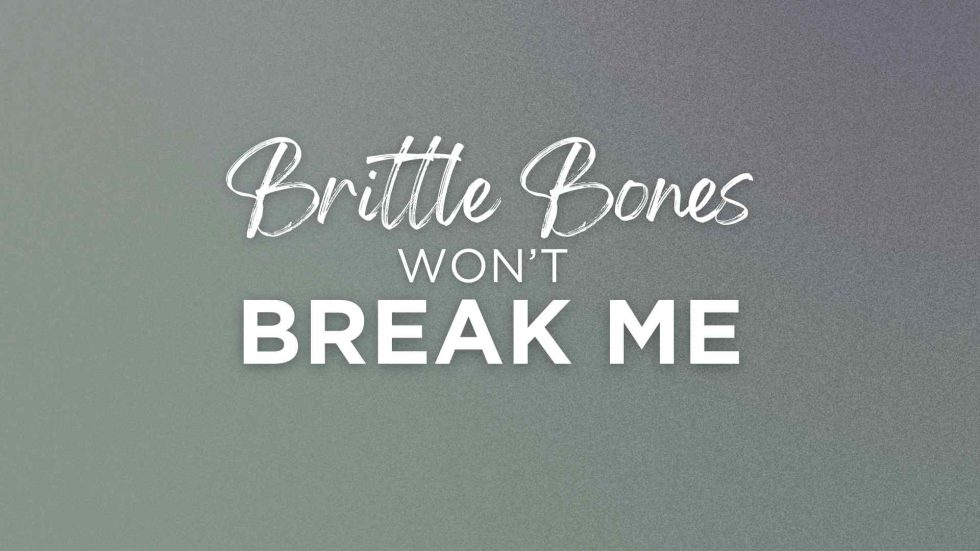‘Fragile doll, do not touch!’ That was the identity given to me at birth by the hospital staff. I was born making cries of pain that came mostly from broken bones. My bones would break at the slightest ‘wrong’ touch. I have Osteogenesis Imperfecta (OI), in layman’s terms, ‘brittle bones’ which led to the need for countless surgeries on my femurs between the ages of seven to nineteen years old. The vicious cycle of falling down, undergoing surgeries, learning to walk and falling down again drained me mentally, physically and emotionally. I lived in fear and anguish. My mother was my main caregiver and we shared an enmeshed relationship. She was my world.
When I was doing my GCE ‘A’ Levels, my mother died of kidney cancer. I had thought all along that she had a benign tumour and would be alright after surgery. But my mother had told our family members to hide her condition from me because I was having all-important examinations. Her dream was for me to go to university, get a job and support myself. The day before her death, after visiting her in the hospital, I even went to watch a movie with my friend. In the hospital, I saw her lying in a pool of blood, with tears at the corner of her eyes. She died alone, with no one at her side.
 Death mocked me. My greatest regret was that I never got to say goodbye and thank you to my mother, the one who loved me most. Filled with guilt and anger with my own naivety at not being able to detect that my mother was on the brink of death, I identified with C S Lewis’ statement, “The death of a beloved is an amputation.” One part of me died with her. I wanted to kill myself, thinking that by dying, I would be ‘reunited’ with her, somewhere out there. However, I had no choice but to continue with the remaining examinations to fulfil her dream and managed to go on to study Social Work and Chinese Language at the National University of Singapore (NUS).
Death mocked me. My greatest regret was that I never got to say goodbye and thank you to my mother, the one who loved me most. Filled with guilt and anger with my own naivety at not being able to detect that my mother was on the brink of death, I identified with C S Lewis’ statement, “The death of a beloved is an amputation.” One part of me died with her. I wanted to kill myself, thinking that by dying, I would be ‘reunited’ with her, somewhere out there. However, I had no choice but to continue with the remaining examinations to fulfil her dream and managed to go on to study Social Work and Chinese Language at the National University of Singapore (NUS).
Home, however, became merely a house after my mother’s death. My father remarried a lady younger than me, even though I was the youngest of my siblings. I did not know how to address her. When she became pregnant and my siblings got married, I felt trapped. Was I supposed to take care of my three step-siblings since I was still single? I could not comprehend why my father would want to have more children when he was so old. Eventually, I left home and started to rent a room in a different house. Depression and panic attacks set in. I questioned the meaning of life. Life became a process of training myself to be a ‘super-woman’, my fiercely independent facade hiding a broken heart within. Later, I was given a diagnosis of bipolar disorder which I struggled to accept. Wasn’t it enough that I had brittle bones and had lost my beloved mother to cancer? Now I had to accept that something was wrong with my brain. When would all this end?
a room in a different house. Depression and panic attacks set in. I questioned the meaning of life. Life became a process of training myself to be a ‘super-woman’, my fiercely independent facade hiding a broken heart within. Later, I was given a diagnosis of bipolar disorder which I struggled to accept. Wasn’t it enough that I had brittle bones and had lost my beloved mother to cancer? Now I had to accept that something was wrong with my brain. When would all this end?
Feeling hopeless, I tried to throw myself in front of passing traffic but did not realise I had chosen a deserted road. Furious, I went home and swallowed half a bottle of Lithium tablets. But even as I tried to swallow, I vomited and suddenly realised I did not want to die – I just did not know what to do with my life. My brother’s girlfriend brought me to the hospital for treatment. There, in the Intensive Care Unit (ICU), I saw tears in the eyes of my family members. I had always thought they did not love me because only my mother had given me unconditional love, and it dawned on me that this life was not my own.
A few years later, my first niece was born and further hope arose in me, reminding me that there is life after death. I decided that I could not be an irresponsible aunt to my dear niece. Medication helped to stabilise my emotions but I still did not know what I was living for.
In 2006, I attended the Christian wake of my good friend’s grandmother. As the pastor spoke about how we surrender the dead into God’s everlasting arms, I cried so incessantly I would not be surprised if people misunderstood that I was the deceased’s granddaughter. I never knew that death could be so peaceful, totally unlike the non-Christian wake of my mother. Subsequently, this good friend invited me to church and I went, feeling that I had nothing to lose. Initially, the church was like a social club to me. God slowly revealed Himself to me through His songs, through my psychiatrist, through a miracle home and through the love of His people. I finally said ‘yes’ to God in the midst of a panic attack! To invite an Almighty God into my mind, heart, soul and body was overwhelming. Now I have a King to take control of my messy life!
 I am now ten years in Christ. It has been a long and fruitful journey – a lot of dying to self and living for Christ. It is only when my mind is focused on the word of God that I can live victoriously. God is the treasure that I received in faith and will not give away. Last year, I started writing my life story with the exhortation for all of us to be involved with what is happening in our society. Because I was given a second chance at life, I am immensely pro-life. I believe that without a physical life, we cannot lay hold of eternal life. I thank God for preserving my life so that I can refresh and comfort others with the comfort He has given me. The joy of the Lord will always be my strength.
I am now ten years in Christ. It has been a long and fruitful journey – a lot of dying to self and living for Christ. It is only when my mind is focused on the word of God that I can live victoriously. God is the treasure that I received in faith and will not give away. Last year, I started writing my life story with the exhortation for all of us to be involved with what is happening in our society. Because I was given a second chance at life, I am immensely pro-life. I believe that without a physical life, we cannot lay hold of eternal life. I thank God for preserving my life so that I can refresh and comfort others with the comfort He has given me. The joy of the Lord will always be my strength.





